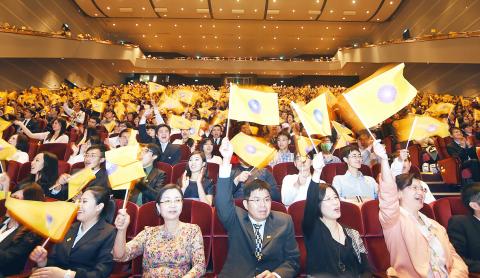A flag representing a newly formed political party has been cleared by the Ministry of the Interior, but its similarity to the flags used by the Chinese Nationalist Party (KMT) and the New Party has raised eyebrows.
According to a report yesterday by the Chinese-language United Daily News, the Republic Party (Minkuotang, 民國黨 or MKT) flag consists of the Republic of China’s national emblem on a golden-yellow background, a design that employs a symbol used by the KMT and the colors used by the New Party.
Members of the KMT and the New Party said the design is a cause for concern, as voters might confuse the MKT flag for that of the KMT or the New Party, the report said.

Photo: Fang Pin-chao, Taipei Times
Meanwhile, the Chinese and English names of the MKT closely resemble those of the KMT, while there is also only a one-character difference between the MKT’s Chinese name and the Democratic Progressive Party’s (民進黨), causing some legislators to ask if the MKT aims to trick voters in next year’s legislative elections, the report said.
“Parties should assume that their supporters have the basic intelligence to discern [different party emblems],” MKT spokesman Hsu Shih-hsun (徐世勳) was quoted as saying.
The MKT’s flag is based on the party’s political beliefs and was not designed to cause confusion, Hsu was quoted as saying.
KMT Legislator Lo Shu-lei (羅淑蕾) said that the MKT seemed to be “exploiting loopholes” in formulating its name and its flag, which “the Ministry of the Interior should have made stringent checks on,” the report quoted Lo as saying.

The Mainland Affairs Council (MAC) today condemned the Chinese Communist Party (CCP) after the Czech officials confirmed that Chinese agents had surveilled Vice President Hsiao Bi-khim (蕭美琴) during her visit to Prague in March last year. Czech Military Intelligence director Petr Bartovsky yesterday said that Chinese operatives had attempted to create the conditions to carry out a demonstrative incident involving Hsiao, going as far as to plan a collision with her car. Hsiao was vice president-elect at the time. The MAC said that it has requested an explanation and demanded a public apology from Beijing. The CCP has repeatedly ignored the desires

Many Chinese spouses required to submit proof of having renounced their Chinese household registration have either completed the process or provided affidavits ahead of the June 30 deadline, the Mainland Affairs Council (MAC) said on Thursday. Of the 12,146 people required to submit the proof, 5,534 had done so as of Wednesday, MAC deputy head and spokesperson Liang Wen-chieh (梁文傑) said. Another 2,572 people who met conditions for exemption or deferral from submitting proof of deregistration — such as those with serious illnesses or injuries — have submitted affidavits instead, he said. “As long as individuals are willing to cooperate with the legal

The Ma-anshan Nuclear Power Plant’s license has expired and it cannot simply be restarted, the Executive Yuan said today, ahead of national debates on the nuclear power referendum. The No. 2 reactor at the Ma-anshan Nuclear Power Plant in Pingtung County was disconnected from the nation’s power grid and completely shut down on May 17, the day its license expired. The government would prioritize people’s safety and conduct necessary evaluations and checks if there is a need to extend the service life of the reactor, Executive Yuan spokeswoman Michelle Lee (李慧芝) told a news conference. Lee said that the referendum would read: “Do

Taiwan's Vice President Hsiao Bi-khim (蕭美琴) said Saturday that she would not be intimidated by the Chinese Communist Party (CCP), following reports that Chinese agents planned to ram her car during a visit to the Czech Republic last year. "I had a great visit to Prague & thank the Czech authorities for their hospitality & ensuring my safety," Hsiao said on social media platform X. "The CCP's unlawful activities will NOT intimidate me from voicing Taiwan's interests in the international community," she wrote. Hsiao visited the Czech Republic on March 18 last year as vice president-elect and met with Czech Senate leadership, including